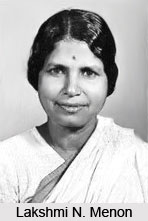 Lakshmi N Menon was one of the most renowned women of her times. She was a good orator who had the capacity to make her audiences dumb folded. She was the Deputy Minister in the Ministry of External Affairs. She wanted women to be free and independent. She was concerned with educating people. She was of the view that illiteracy is the root cause of all evils. Lakshmi was born on 1899. She was married to Prof. V.K. Menon who was a scholar and a critic.
Lakshmi N Menon was one of the most renowned women of her times. She was a good orator who had the capacity to make her audiences dumb folded. She was the Deputy Minister in the Ministry of External Affairs. She wanted women to be free and independent. She was concerned with educating people. She was of the view that illiteracy is the root cause of all evils. Lakshmi was born on 1899. She was married to Prof. V.K. Menon who was a scholar and a critic.
She did her schooling and college education at Kerala For higher studies she went to London. She was an excellent teacher who started her teaching career at Madras. She played n important role in establishing the All India Women`s Conference (AIWC). She purchased the land for AIWC at Delhi, mortgaging her own ornaments and property. She had a deep knowledge of World Affairs and was Deputy Minister of External Affairs in Pt. Nehru`s cabinet. She was interested in traveling around the world. She was the chairperson of a number of U.N. Commissions and her area of concern was to raise the status of women.
When China attacked India, Pt Nehru deputed her as India`s roving ambassador to clarify India`s stand to various nations in the world. She was elected to the Rajya Sabha from Bihar. She was interested in the activities of Kasturba Gandhi National Memorial Trust and she became the President of the Trust. She was influenced by Gandhian thoughts and she wore only Khadi clothes. She gave the workers of Kasturba Trust, a well-planned programme of eradication of illiteracy amongst women. She wanted women to be free and emancipated. She believed that women can be emancipated only by giving them education.
The concept of `Mother`s Day` is also Lakshmi Menon`s gift. She thought that Kasturba`s memory should be commemorated as `Mother`s Day`, because Kasturba was `Nation`s Mother-Everybody`s Mother`. According to her, the `Mother`s Day` should be observed not only in the Kasturba Trust but also in every home. She was of the opinion that in every home, the mother works day and night but nobody appreciates her efforts. Therefore, there should be a day which should be called a `Mother`s Day` and on this day the children should rise in the morning, put on new clothes and then go to their mother and bow before her and pay their respects to her. As a token of their affection to their mother, they should offer a flower or a leaf to their mother and humbly say to her, "Mother, how much hard work you put in for us daily. Today, you please take rest. Today, we will offer our services to you. Also, today, we will attend to the daily household duties." Since then, Mother`s Day was observed in this way.
Her two virtues, which influenced others were non-attachment and non-acquisiteness She had no attachment for anything. Any earthly thing never tempted her. She had no desire for anything and accepted anything that came in her way believing that it was her gift from God.
Smt. Menon was studying in England when she first met Pandit Nehru there. She went with him to a conference in USSR. On her return to India, Mrs. Menon along with her husband, Prof. V K Menon, took up teaching. Smt. Menon provided a free and compulsory education for all children so that no new illiterates were added to the large number of illiterates already in India. She wanted all voters to sign their name instead of their `finger prints".
She had keen interest in women`s problems. She was an active member of All India Women`s` Conference and became its President in due course. Pandit Nehru persuaded her to join politics. She was brought to Rajya Sabha by him and was made Nehru`s Parliamentary Secretary. She first rose to Deputy Minisfership and then became Minister of State in the Ministry of External Affairs. Later she became Chairman of the Kasturba Gandhi Nation Memorial Trust. She wanted to spread the light of literacy among women, adivasis and Dalits. Her aim was to make all women literate by the year 2000. She passed the last days of her life in the service of the poor and weaker section. She breathed her last on 1994.




















